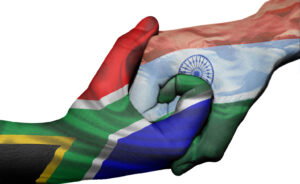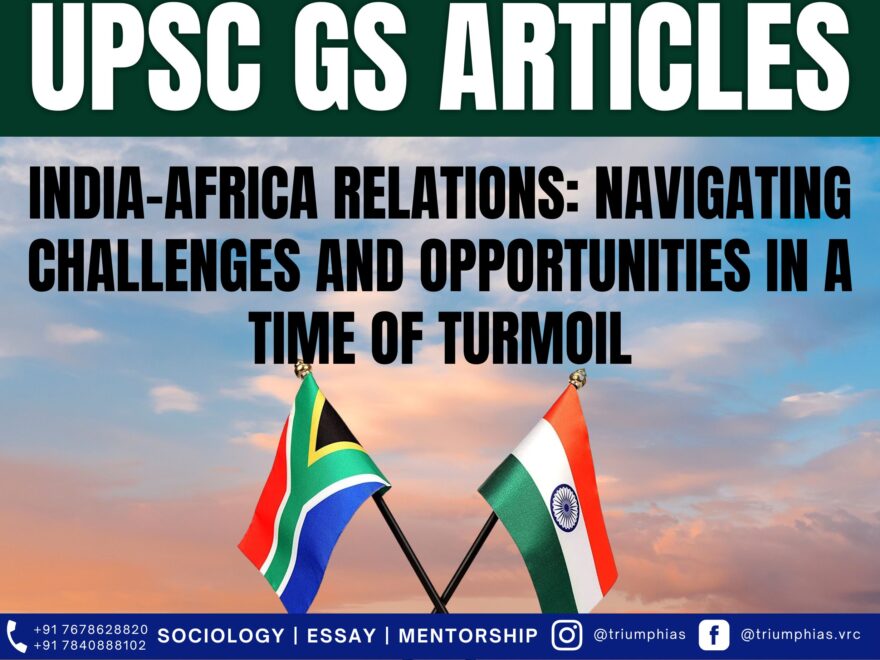India Africa Relationship
(Relevant for General Studies Paper Prelims/Mains)

India Africa relationship: what new in turmoil
Similar to a distant landlord, Africa is currently voicing its needs on global platforms like BRICS (Brazil, Russia, India, China, and South Africa), the G-20, and the United Nations General Assembly. With 54 nations and constituting over a quarter of the “Global South,” the African continent is represented by South Africa in BRICS and the G-20, making it an atypical spokesperson for the entire African region.
Challenges and Disruptions faced by African Countries
- Governance Issues: Many African nations grapple with inadequate governance, rampant corruption, favouritism, and a lack of accountability. These challenges erode the credibility and effectiveness of state institutions, fostering public discontent and mistrust.
- Unplanned Development: Numerous African countries confront the complexities of rapid population growth, urbanization, environmental degradation, and limited resources. Managing these issues demands strategic planning and efficient administration to ensure sustainable progress and societal well-being.
- Ethnic Dominance: Across various African countries, ethnic and tribal diversity prevails, offering both cultural richness and potential conflict. Some ruling tribes or elites tend to monopolize resources and authority, sidelining marginalized groups and fomenting resentment and uprisings.
- Inter-Tribal Conflicts: Conflicts frequently arise between different tribes or communities in many African nations, often over resources like land, water, or livestock. Climate change, droughts, famines, or displacement can escalate these disputes, causing loss of life, property destruction, and humanitarian crises.
- Terrorism Threat: The menace of Islamic extremism and terrorism looms over many African countries, often connected to global networks such as Al-Qaeda or ISIS. These groups exploit local vulnerabilities, recruiting members, launching attacks, and destabilizing regional security and stability.
- Climate Impact: Climate change poses substantial risks to numerous African nations, including rising temperatures, erratic rainfall, floods, droughts, desertification, and diseases. These challenges imperil livelihoods, food security, health, and ecosystem resilience.
- Food Inflation: The problem of soaring food prices affects many African nations, driven by supply shocks, demand pressures, market distortions, speculation, or currency depreciation. These factors erode purchasing power, particularly among the impoverished and vulnerable segments.
- Urbanization and Youth Joblessness: Rapid, unmanaged urbanization in multiple African countries leads to issues like slums, overcrowding, pollution, crime, and social isolation. Moreover, large and growing youth populations grapple with high rates of joblessness, underemployment, or informal work, fostering frustration and unrest.
- External Interference: Military interventions by foreign powers, including France, the United States, and Russia’s Wagner Group, often exacerbate rather than mitigate conflicts. These actions often serve to protect economic interests and retain dictatorial regimes, complicating matters.
- Return of Military Rule: In the past decade, military leaders have regained control in countries like Egypt, Burkina Faso, Mali, and Niger. Meanwhile, Libya and Sudan have experienced internal divisions within their armed forces, resulting in power struggles.
- Regional and Continental Dynamics: Regional organizations play a pivotal role in maintaining stability. However, when member states are governed by military regimes, enforcing democratic norms becomes challenging. This was evident when ECOWAS’s military intervention proposal for Niger faced opposition from Mali and Burkina Faso.
- Shifts in China’s Role: China’s considerable investments in Africa have significantly impacted the continent’s economic growth. Nevertheless, Africa’s overreliance on exporting raw materials to China exposes vulnerability to changes in China’s economic priorities, potentially posing economic difficulties.
- Debt Worries: While China’s Belt and Road Initiative has spurred infrastructure development in African nations, some countries have accumulated substantial debts.
- Geopolitical Tensions: Involvement of global powers in Africa has historical, economic, and geopolitical dimensions. Colonial legacies and economic interests of nations like France, the UK, and the US intersect with Africa, influencing stability and development.
- Economic Hurdles: Downturns in major global economies can restrict their engagement with Africa, affecting aid, investment, and trade relationships. Europe’s focus on addressing illegal migration from Africa has also shaped its interaction with the continent, potentially overshadowing broader developmental concerns.
India’s concern
- Economic Consequences: The instability and insecurity in Africa have reverberations on India’s substantial trade and investment connections with the continent. In the fiscal year 2022-23, trade between India and Africa amounted to USD 98 billion, with India ranking as the fifth-largest investor in Africa.
- Additionally, India extends concessional lines of credit to finance development projects in Africa, disbursing over USD 12.37 billion in concessional loans. Since 2015, India has successfully executed 197 projects and granted 42,000 scholarships.
- Security Implications: India possesses a strategic stake in upholding tranquillity and steadiness in Africa, particularly in the Horn of Africa, a critical maritime passage connecting the Indian Ocean to the Suez Canal. Through its engagement, India participates in peacekeeping initiatives, counter-terrorism endeavours, and the enhancement of capabilities for African security forces. The turbulence experienced in Africa endangers India’s security pursuits and goals, fostering conducive environments for terrorism, piracy, organized crime, and human trafficking.
- Diplomatic Influence: Rooted in shared respect, solidarity, and collaboration, India’s longstanding partnership with Africa holds paramount significance. India is a proponent of African nations’ aspirations for self-sufficiency, democratic governance, and holistic development.
- Moreover, India’s considerable diaspora, comprising around 3 million individuals, contributes to trade, commerce, and professional services within Africa.
What India can do?
- India possesses the potential to utilize its diplomatic sway and positive reputation to back African nations in their pursuit of peace, democratic governance, and comprehensive development. India has the capacity to elevate its trade and investment connections with Africa by extending broader market access, preferential tariff arrangements, and superior goods and services. Additionally, India can amplify its contribution to African development by expanding its development aid, encompassing increased concessional loans, grants, and technical collaboration.
India stands to fortify its security collaboration with Africa by furnishing heightened training, advanced equipment, and intelligence resources to the security forces across the continent. India can invigorate its cooperation in science, technology, and innovation with Africa through a heightened commitment to supporting scientific research and development ventures on the continent. Furthermore, India can play a pivotal role in transferring and adapting technology to Africa by offering cost-effective and suitable solutions that align with the continent’s distinct challenges and opportunities.
Sample Question for UPSC Sociology Optional Paper:
Question 1: What are the key challenges faced by African countries in governance and development?
Short Answer: African countries face multiple challenges including governance issues, rapid population growth, ethnic dominance, unplanned development, and threats from terrorism and climate change.
Question 2: How do Africa’s challenges affect India’s economic and security interests?
Short Answer: Africa’s instability has implications for India’s trade and investment, as well as its security interests in the region, especially in critical maritime passages.
Question 3: What has been India’s economic engagement with Africa in recent years?
Short Answer: India has trade and investment connections with Africa amounting to USD 98 billion and has extended over USD 12.37 billion in concessional loans for development projects.
Question 4: What are the security implications for India concerning Africa’s turmoil?
Short Answer: Instability in Africa could jeopardize India’s security pursuits, offering environments conducive to terrorism, piracy, organized crime, and human trafficking.
Question 5: How can India utilize its diplomatic influence to aid in Africa’s development?
Short Answer: India can extend broader market access, preferential tariff arrangements, increase development aid, and bolster its security collaboration with African nations.
To master these intricacies and fare well in the Sociology Optional Syllabus, aspiring sociologists might benefit from guidance by the Best Sociology Optional Teacher and participation in the Best Sociology Optional Coaching. These avenues provide comprehensive assistance, ensuring a solid understanding of sociology’s diverse methodologies and techniques.
India-Africa relations, governance challenges, economic concerns, geopolitical tensions, trade and investment, security implications, diplomatic influence, sustainable development, India’s role in Africa, Best Sociology Optional Coaching, Sociology Optional Syllabus.

Why Vikash Ranjan’s Classes for Sociology?
Proper guidance and assistance are required to learn the skill of interlinking current happenings with the conventional topics. VIKASH RANJAN SIR at TRIUMPH IAS guides students according to the Recent Trends of UPSC, making him the Best Sociology Teacher for Sociology Optional UPSC.
At Triumph IAS, the Best Sociology Optional Coaching platform, we not only provide the best study material and applied classes for Sociology for IAS but also conduct regular assignments and class tests to assess candidates’ writing skills and understanding of the subject.
Choose The Best Sociology Optional Teacher for IAS Preparation?
At the beginning of the journey for Civil Services Examination preparation, many students face a pivotal decision – selecting their optional subject. Questions such as “which optional subject is the best?” and “which optional subject is the most scoring?” frequently come to mind. Choosing the right optional subject, like choosing the best sociology optional teacher, is a subjective yet vital step that requires a thoughtful decision based on facts. A misstep in this crucial decision can indeed prove disastrous.
Ever since the exam pattern was revamped in 2013, the UPSC has eliminated the need for a second optional subject. Now, candidates have to choose only one optional subject for the UPSC Mains, which has two papers of 250 marks each. One of the compelling choices for many has been the sociology optional. However, it’s strongly advised to decide on your optional subject for mains well ahead of time to get sufficient time to complete the syllabus. After all, most students score similarly in General Studies Papers; it’s the score in the optional subject & essay that contributes significantly to the final selection.
“A sound strategy does not rely solely on the popular
Opinion of toppers or famous YouTubers cum teachers.”
It requires understanding one’s ability, interest, and the relevance of the subject, not just for the exam but also for life in general. Hence, when selecting the best sociology teacher, one must consider the usefulness of sociology optional coaching in General Studies, Essay, and Personality Test.
The choice of the optional subject should be based on objective criteria, such as the nature, scope, and size of the syllabus, uniformity and stability in the question pattern, relevance of the syllabic content in daily life in society, and the availability of study material and guidance. For example, choosing the best sociology optional coaching can ensure access to top-quality study materials and experienced teachers. Always remember, the approach of the UPSC optional subject differs from your academic studies of subjects. Therefore, before settling for sociology optional, you need to analyze the syllabus, previous years’ pattern, subject requirements (be it ideal, visionary, numerical, conceptual theoretical), and your comfort level with the subject.
This decision marks a critical point in your UPSC – CSE journey, potentially determining your success in a career in IAS/Civil Services. Therefore, it’s crucial to choose wisely, whether it’s the optional subject or the best sociology optional teacher. Always base your decision on accurate facts, and never let your emotional biases guide your choices. After all, the search for the best sociology optional coaching is about finding the perfect fit for your unique academic needs and aspirations.
To master these intricacies and fare well in the Sociology Optional Syllabus, aspiring sociologists might benefit from guidance by the Best Sociology Optional Teacher and participation in the Best Sociology Optional Coaching. These avenues provide comprehensive assistance, ensuring a solid understanding of sociology’s diverse methodologies and techniques. Sociology, Social theory, Best Sociology Optional Teacher, Best Sociology Optional Coaching, Sociology Optional Syllabus.
Best Sociology Optional Teacher, Sociology Syllabus, Sociology Optional, Sociology Optional Coaching, Best Sociology Optional Coaching, Best Sociology Teacher, Sociology Course, Sociology Teacher, Sociology Foundation, Sociology Foundation Course, Sociology Optional UPSC, Sociology for IAS,
Follow us :
🔎 https://www.instagram.com/triumphias
🔎https://www.youtube.com/c/TriumphIAS
https://t.me/VikashRanjanSociology
Find More Blogs
|
Scope of the subject and comparison with other social sciences |
|||
|
|
|
|
Modernity and social changes in Europe |

